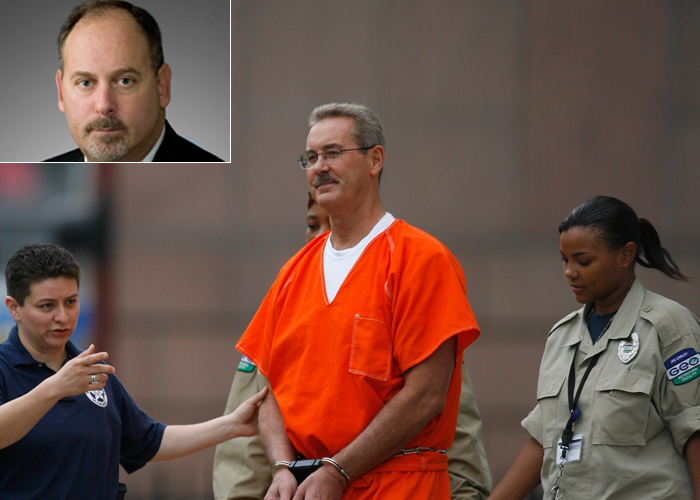The new inspector general report on the SEC’s handling of the Allen Stanford alleged Ponzi scheme case paints a devastating picture of the agency’s repeated failures to pursue the billionaire banker, despite a widespread belief within the SEC’s Fort Worth office that he was a fraud.
At the center of the story is Spencer Barasch, the chief of enforcement at the SEC’s Fort Worth office, who declined to pursue Stanford multiple times, only to later jump ship to become a partner at a big private law firm where he proceeded to represent none other than ‘Sir’ Allen Stanford.
The inspector general has referred Barasch to the bars of Washington and Texas, where he is licensed, for potential violation of conflict of interest rules.
Stanford is now in jail facing charges over an alleged $7 billion Ponzi scheme.
In March 2005, Barasch announced he was leaving the SEC after 17 years, with seven of those as the head of the Fort Worth enforcement division, for the international law firm Andrews Kurth. He joined the firm’s securities enforcement team.
“I am excited to become a part of this premier law firm, and look forward to using my regulatory background and experience to provide an expanded level of service to the firm’s clients,” Barasch said in a Andrews Kurth press release.
A couple months later, Stanford Financial Group executives were looking for representation to help them handle a burgeoning SEC inquiry into the company. They got wind of Barasch’s new gig and word made its way up to Stanford himself, who said in an email to an underling, “This guy looks good and probably knows everyone at the Fort Worth office. Good job.”
A few days later, Barasch emailed an SEC ethics counsel to get the green light to work for Stanford. “I am not aware of any conflicts and I do not remember any matters pending on Stanford while I was at the [C]ommission,” he wrote.
In fact, the IG found, Barasch was involved in deciding at least four times to close investigations of Stanford Financial or to not pursue findings by SEC investigators that the firm was a fraud.
The first of those came in August 1998 when Barasch, recently promoted to head of enforcement at the Fort Worth office, made the decision to kill a three-month old inquiry into Stanford’s business.
Even though his staff had not “determined there was no fraud,” Barasch said the matter was closed due to “some problems with the case,” according to another SEC staffer’s account quoted in the IG report. Those problems included the enforcement staff’s belief that Stanford, though himself based in the U.S., did not have U.S. investors, along with the institutional “preference for ‘quick hit’ cases,” according to the report.
But there was dissent in the SEC ranks over Barasch’s decision.
In an interview with the IG, an SEC staffer who had reviewed Stanford’s financial statements described her reaction as “shock and disbelief and this incredible feeling of failure and great disappointment”.
In early 2001, Barasch received a complaint which began: “I am currently providing [redacted] services to an Antigua company and have become very concerned about the unusual activities of the Stanford Financial Group, a Texas based organisation, operating though subsidiaries on the Island.” But nothing was ever done in response to the complaint, the IG found.
In 2002, the Fort Worth office’s examination staff again looked at Stanford Financial and grew suspicious that “the international bank was a Ponzi scheme,” one staffer told the IG. They discussed the matter with the enforcement staff and forwarded a report on Stanford to Barasch. But Barasch told the IG that he couldn’t recall seeing it, and the IG found “no indication” that he ever read the report.
At a March 2005 conference in which an attorney with the Forth Worth office’s examination division gave a talk on the Stanford case, Barasch looked “annoyed” and “summarily told [her] … it was not something they were interested in” immediately after the presentation, according to IG interviews with SEC staffers. He told the IG he couldn’t remember the presentation or the conversation.
The examination staff then deliberately waited until Barasch left the SEC in April 2005 — to become a partner at Andrews Kurth on the firm’s securities enforcement team — to refer the matter yet again to the office’s enforcement division, according to the IG.
The SEC ethics counsel denied Barasch’s request to work for Stanford, made soon after he left the SEC. (In an email to an underling, Stanford reacted angrily: “This is bs and I want to know why the SEC would /could conflict him out.”)
But Barasch was undeterred. “Approximately one year after the SEC’s Ethics Office determined that Barasch’s conflicts … prevented him from representing Stanford in connection with the SEC investigation, Stanford retained Barasch to do just that,” the IG report says.
He belatedly sought — and was denied — permission to represent Stanford Financial Group, but only after billing for 12 hours of work.
The IG has referred the matter to the bars in Washington, D.C., and Texas, where Barasch holds membership, as potentially violating professional ethics.
Barasch did not immediately respond to a request for comment. But in a statement provided by his firm, Andrews Kurth Managing Partner Bob Jewell said Barasch “served the SEC with honor, integrity and distinction” and did not violate conflicts of interest.
When the SEC finally sued Stanford for fraud in February 2009, Barasch was on the scene again, eager to represent Stanford, only to be denied permission. He described his thinking in an interview with IG investigators:
“In 2009 the whole thing blows up. Every lawyer in Texas and beyond is going to get rich over this case. Okay? And I hated being on the sidelines. And I was contacted right and left by people [to] represent them.”






